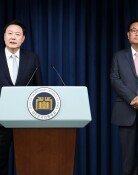U.S.-centric world order is under attack
U.S.-centric world order is under attack
Posted May. 30, 2017 07:20,
Updated May. 30, 2017 07:22
German Chancellor Angela Merkel said on Sunday, "The EU cannot completely rely on the U.S. and Britain any more. We must fight for our own future.” The European Union’s leading power and the de-facto strongest leader in Europe has declared an independent move. It is the first time that Europe talked about leaving the U.S. for the past some 70 years since World War II. The world order is rocked again after the emergence of U.S. President Donald Trump.
Though it was mentioned during her election campaign, Merkel seems to have revealed a long planned idea rather than an off-the-cuff remark at the right timing. Above all, Europeans who have feared a direct security threat from Russia since Russia’s military intervention of Crimea have a fundamental anxiety over whether the U.S. will play a due role for the security of Europe. The Trump-Russia scandal, which is weakening President Trump’s position at home, is another threat to Europeans. On top of this, Trump urged Germany to spend more on defense, pointing to Germany’s trade surplus against the U.S. as he pledged during the presidential election. For Chancellor Merkel, it has reached a critical point.
Furthermore, U.S. President Trump shocked EU leaders as he did not express his commitment to Article 5 at the G7 summit. It is the first time that a U.S. president did not mention his commitment to the mutual assistance clause in the NATO charter in the transatlantic alliance since former U.S. President Harry Truman in 1949. Instead, Trump lambasted other NATO members for not keeping their promise to increase spending on their militaries to two percent of their GDP.
Merkel who is likely to have a fourth term is considering an option to create an independent EU military, instead of relying on the U.K. and the U.S., by reinforcing the ties with France’s Emmanuel Macron who pursues free trade and the European bloc. Europe might split into the EU led by Germany and France and the post-Brexit U.K., checking and balancing each other.
Trump’s protectionism and nationalism will lead to the increased influence of the world’s superpowers and regionalism. Furthermore, it could increase regional disputes. Trump, who urged for allies including the NATO, South Korea, Japan and Saudi Arabia to spend more on defense during his election campaign, has been making his own words one by one. The question posed to Europe – how much do we should rely our security on the partner who thinks alliance as a money-making business – also applies to us. Korea’s diplomacy, which should increase our bargaining power over the U.S. without undermining the value of our alliance, is now put to an unprecedented test.
Headline News
- Med professors announce intention to leave hospitals starting Thursday
- Bridge honoring Sgt. Moon Jae-sik unveiled in Pennsylvania
- Chief of Staff Chung tells presidential secretaries to stay away from politics
- US FTC bans noncompete agreements
- N. Korea launches cyberattacks on S. Korea's defense companies







